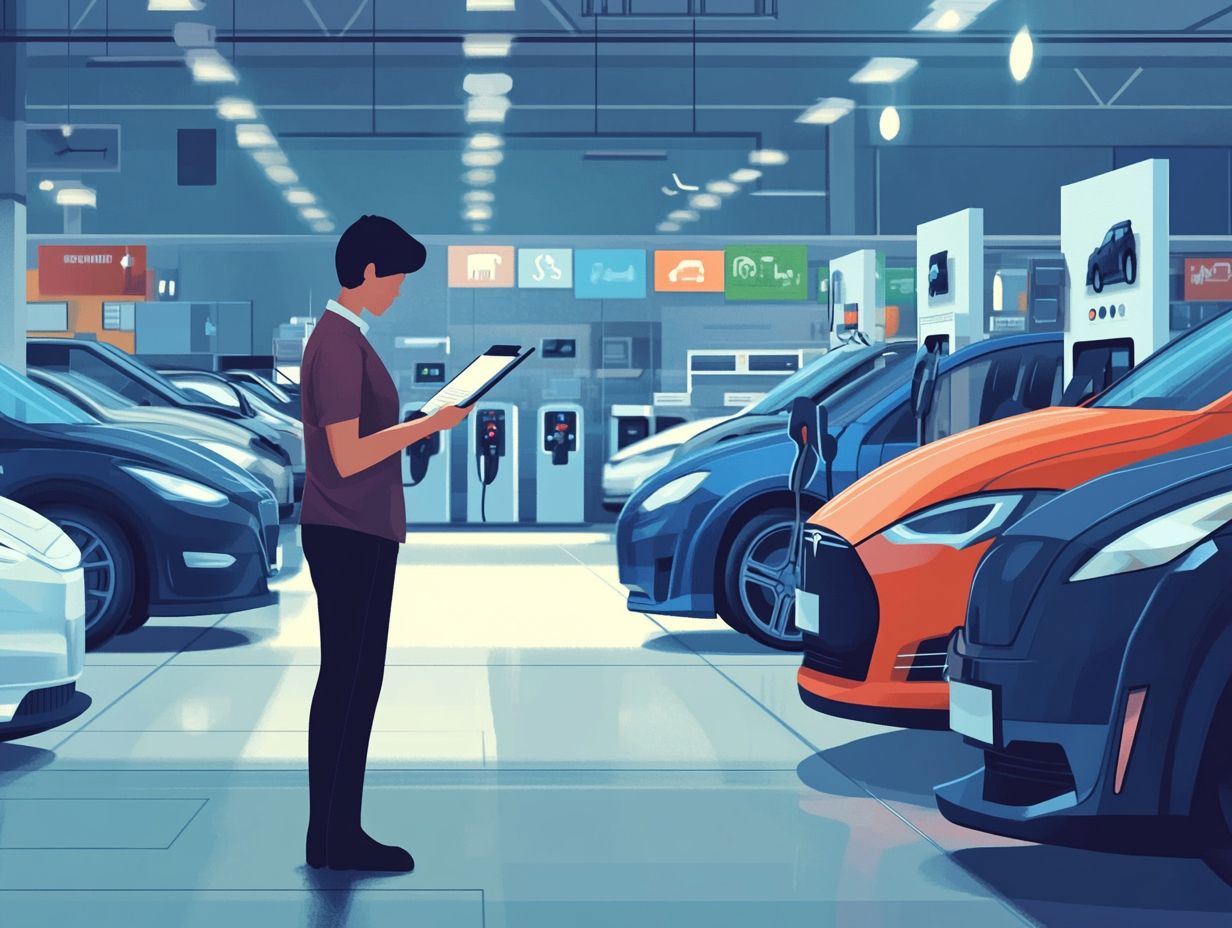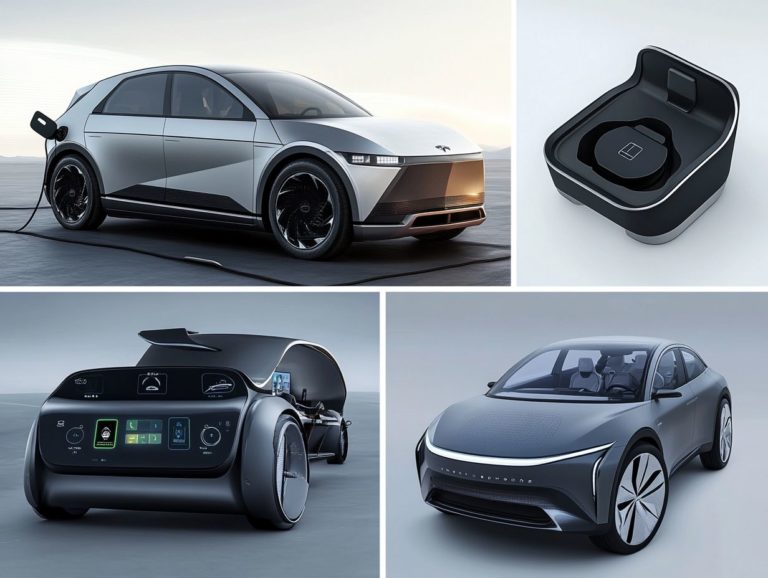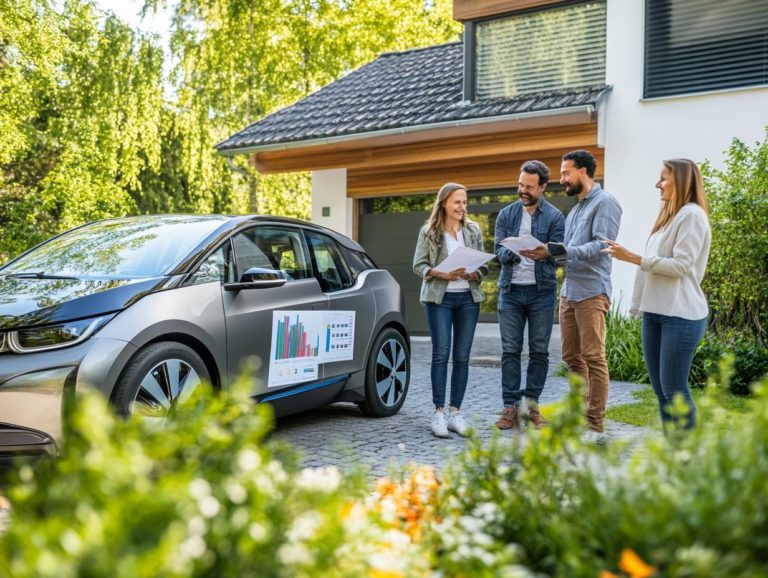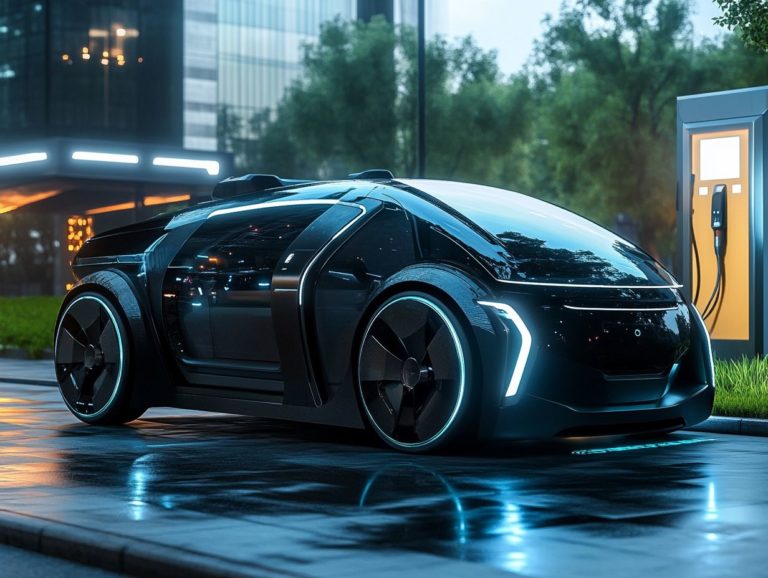10 Questions to Ask Before Buying an EV
Thinking about switching to an electric vehicle (EV)? With EVs becoming increasingly popular, it’s essential to ask the right questions before you make a decision.
This article delves into ten essential topics designed to empower your decision-making process. You’ll explore key aspects, from range and charging times to safety features and maintenance requirements, ensuring you have all the information at your fingertips.
Whether you’re a first-time buyer or simply intrigued by the prospect of EV ownership, this guide is crafted to provide you with comprehensive insights.
Contents
- Key Takeaways:
- 1. What Is the Range of the EV?
- 2. How Long Does It Take to Charge the Battery?
- 3. What Is the Warranty on the Battery?
- 4. How Does the EV Handle in Different Weather Conditions?
- 5. What Are the Safety Features of the EV?
- 6. What Type of Maintenance Does the EV Require?
- 7. How Much Does It Cost to Own and Operate an EV?
- 8. Is There an Option for Fast Charging?
- 9. What Is the Resale Value of the EV?
- 10. Are There Any Government Incentives for Owning an EV?
- What Are the Different Types of EVs Available?
- What Are the Pros and Cons of Owning an EV?
- How Does an EV Compare to a Gasoline Vehicle in Terms of Performance?
- What Are the Most Common Concerns About Owning an EV?
- How Can I Find a Reliable EV Dealer?
- What Are Some Tips for Maintaining an EV?
- Frequently Asked Questions
- 1. What is an EV and why should I consider buying one?
- 2. How do I know if an EV is right for me?
- 3. What types of EVs are available?
- 4. How far can I drive on a single charge?
- 5. How long does it take to charge an EV?
- 6. Are there any tax incentives for purchasing an EV?
Key Takeaways:

- Consider the range of the EV before buying to ensure it meets your daily driving needs.
- Research the warranty on the battery to understand its coverage and potential replacement costs.
- Look into the safety features of the EV to ensure safe driving in various weather conditions.
1. What Is the Range of the EV?
The range of an electric vehicle (EV) is an important factor for you as a potential buyer. It directly influences how far you can travel on a single charge and shapes your overall driving experience.
Thanks to advancements in battery technology, you ll find a variety of models from top manufacturers like Tesla, Ford, General Motors, and Hyundai offering impressive driving ranges that put range anxiety to rest.
Take the Tesla Model S, for example it boasts a remarkable range of up to 405 miles. Then there s the Lucid Air, which can reach an astonishing 520 miles, truly highlighting the potential of electric mobility.
On the other hand, the Chevrolet Bolt EV offers about 259 miles, providing a sensible option for daily commuters. The importance of range becomes even clearer when you factor in driving conditions, vehicle weight, and climate, all of which can significantly impact performance.
Research firms meticulously evaluate and report on these statistics, ensuring transparency and enabling you in your decision-making process.
2. How Long Does It Take to Charge the Battery?
Charging times for electric vehicles (EVs) can vary dramatically depending on the type of charging station you choose. Options range from home setups to fast charging stations that can replenish your battery in mere minutes.
For most homeowners, a Level 1 charger is the most straightforward choice, utilizing a standard household outlet for the convenience of overnight charging. If you find yourself frequently on the go, a Level 2 charger available in both public and residential settings might be more efficient for you.
Level 2 chargers can cut down charging times to just a few hours. On the high-speed end, DC fast charging stations offer an impressive boost in a short time, making them perfect for road trips or busy days.
When you look at charging times for popular models like the Tesla Model 3 or Nissan Leaf, you ll see that while a Level 1 charger might take around 24-48 hours for a full charge, a Level 2 can do it in 8-10 hours. Meanwhile, DC fast charging can get you to approximately 80% charge in just 30 minutes.
The variety in charging options not only elevates your ownership experience but also plays a vital role in swaying potential buyers’ decisions.
3. What Is the Warranty on the Battery?
The warranty on an EV s battery pack is an important factor to consider when buying. It often reflects the manufacturer s confidence in the longevity and reliability of their technology.
Take Tesla, for instance; they generally offer an impressive eight-year warranty with unlimited mileage for their battery packs. On the other hand, Ford and General Motors offer similar durations, but they may impose specific mileage limits that could impact your long-term ownership experience.
These varying warranty periods not only influence your initial purchase decision but also carry significant implications for future maintenance costs. By understanding the specific terms and coverage provided by manufacturers, you can assess the risks associated with battery degradation and replacement expenses, ensuring that you make well-informed choices about your investment in electric mobility.
Ready to choose the right electric vehicle for you? Start your journey today!
4. How Does the EV Handle in Different Weather Conditions?
Electric vehicles (EVs) are designed to perform well in various weather conditions. It’s important to understand how they handle in rain, snow, and extreme temperatures, especially if you are considering models like electric SUVs and sedans.
Temperature significantly affects battery performance, particularly in colder climates where range anxiety can be a concern. For instance, models like the Tesla Model Y and Ford Mustang Mach-E have systems that keep the battery at the right temperature, enhancing overall efficiency.
These vehicles feature all-wheel drive and advanced traction control for better grip and stability on slippery surfaces. When temperatures drop, battery range may decrease, making it crucial for you to understand these dynamics, particularly during winter travel when charging options can be limited.
5. What Are the Safety Features of the EV?
Safety features in electric vehicles (EVs) are essential. They integrate advanced technologies that protect occupants and enhance the driving experience. This makes them a smart choice for you if you value safety in your vehicle.
Leading manufacturers like Tesla, Ford, and General Motors equip their models with numerous cutting-edge systems. For example, automatic emergency braking applies the brakes to prevent collisions when a potential hazard is detected. Collision avoidance systems help you steer clear of obstacles, reducing stress during drives.
Lane-keeping assistance is another valuable feature that keeps your vehicle centered in its lane, improving safety on the road. These innovative systems do more than provide peace of mind; they significantly enhance the appeal of EVs, reassuring you that these vehicles are equipped to handle today’s driving challenges.
6. What Type of Maintenance Does the EV Require?

The maintenance needs of electric vehicles (EVs) differ from those of traditional gasoline vehicles, leading to lower overall costs. EVs focus on specific electrical components, such as the battery pack and charging systems.
Unlike conventional cars that require regular oil changes and mechanical inspections, EVs mainly need software updates to maintain performance. Routine battery care like monitoring your charging habits and battery health is crucial for extending your vehicle’s lifespan.
This unique approach to maintenance can lower ownership costs, as fewer trips to the mechanic often mean more savings for you. As the market grows, electric vehicle dealers are enhancing their services to help you manage these tasks easily.
7. How Much Does It Cost to Own and Operate an EV?
The total cost of owning and operating an electric vehicle (EV) includes various factors. From the manufacturer’s suggested retail price (MSRP) and energy costs to potential tax credits, understanding the financial implications is essential.
You should consider not only the upfront costs of purchasing an EV but also ongoing expenses like charging electricity, which can vary based on local rates. To make the most informed decision, check out these 5 tips for test driving an electric vehicle. Maintenance costs for electric cars are typically lower due to fewer moving parts, leading to significant long-term savings.
Various incentives, such as federal tax credits and state rebates, can help offset initial expenses. When you compare these factors to traditional gasoline vehicles, it becomes clear that making an informed decision involves evaluating long-term savings and considering the environmental impact as well.
8. Is There an Option for Fast Charging?
Fast charging options are quickly becoming the norm for electric vehicles (EVs). They allow you to recharge your vehicle in a snap at public charging stations, making this exciting improvement in convenience perfect for anyone considering switching to an EV.
Thanks to new technology, charging stations are conveniently placed throughout urban areas and along highways. This makes long road trips more accessible than ever. Major players like EVgo and PlugShare lead the charge, providing access to a vast network of fast chargers. These stations deliver power at a much higher rate than standard home chargers, cutting your charging time to as little as 30 minutes for a substantial battery boost.
This capability underscores the practicality of owning an EV for your daily commute. It also eases lingering concerns about range anxiety on longer journeys. As a result, electric vehicles are becoming an integrated part of everyday life, inviting greater acceptance and enthusiasm for sustainable driving.
9. What Is the Resale Value of the EV?
The resale value of electric vehicles (EVs) is an important point for you as a buyer. It influences your long-term investment and the overall selling price in the used EV market.
Several elements play significant roles in determining these values. Brand reputation heavily influences your preferences and confidence in a purchase. New technology and the condition of the battery are equally important; if newer models boast superior range or features, your vehicle’s depreciation could accelerate dramatically.
For example, popular models from brands like Ford, Tesla, and Nissan exhibit varying resale values largely due to their advancements and brand perception.
By understanding these dynamics, you can make informed decisions and navigate the evolving landscape of electric vehicle ownership effectively.
10. Are There Any Government Incentives for Owning an EV?
Government incentives for owning electric vehicles (EVs) are instrumental in promoting sustainable transport. Tax credits can significantly alleviate upfront costs for you as a prospective EV buyer.
Beyond federal tax credits, various states and local governments offer their own incentives, including rebates, grants, and reduced registration fees. These financial perks enhance the appeal of purchasing an EV and encourage wider adoption of eco-friendly vehicles.
By lowering the overall cost of ownership, these incentives directly impact your purchasing decisions, making EVs a more accessible option for many buyers. As awareness of electric vehicle technology continues to grow, these programs work together to reduce emissions and promote cleaner air, effectively supporting your transition to greener transportation solutions.
What Are the Different Types of EVs Available?
The landscape of electric vehicles (EVs) is vast, showcasing a variety of models tailored to your unique preferences and requirements. Are you drawn to compact cars or electric SUVs? Each option presents its own distinct features and advantages for discerning EV buyers, so consider the 5 essential features to look for in an EV.
Consider sedans like the Tesla Model 3, which shines with its impressive range and advanced technology, providing you with a seamless driving experience perfect for daily commutes. Electric SUVs, such as the Ford Mustang Mach-E, cater to families and thrill-seekers alike, boasting spacious interiors and advanced safety features that ensure comfort and security for everyone on board.
For those who demand strength and capability, trucks like the General Motors Hummer EV deliver power alongside an eco-friendly alternative for heavy-duty tasks. These models exemplify how leading manufacturers are pushing the boundaries of innovation to meet your diverse needs, all while championing sustainable driving practices.
Now is the perfect time to consider switching to an EV! With so many options available, you can surely find the right fit for your lifestyle.
What Are the Pros and Cons of Owning an EV?

Owning an electric vehicle (EV) presents a mix of advantages and disadvantages. It’s crucial to weigh the benefits, like environmental impact and lower energy costs, against the drawbacks, such as the initial purchase price and the fear of running out of battery power before reaching a charging station. To navigate this decision better, consider avoiding the top 7 mistakes when buying an EV.
The allure of reduced emissions is a significant factor in choosing an EV. These vehicles produce no tailpipe emissions, enhancing air quality, particularly in urban settings. With lower fuel costs, you can save considerably over time, especially if you charge at home or during off-peak hours.
There are hurdles to consider, but don’t let them discourage you! The limited charging infrastructure can complicate longer journeys, and resale values can vary widely across different models. For example, while the Tesla Model 3 offers a robust charging network and impressive resale value, other models might not perform as well in these areas. To navigate this process better, check out our guide on how to prepare for your first EV purchase. Think carefully about your needs and situation.
How Does an EV Compare to a Gasoline Vehicle in Terms of Performance?
When comparing electric vehicles (EVs) to gasoline cars, the performance metrics acceleration, handling, and overall driving experience showcase the advantages of EV technology. This makes a compelling case for many potential buyers.
Many users rave about the instant torque that electric motors deliver, providing exhilarating acceleration that often outpaces traditional gasoline engines. For instance, a recent review highlighted an EV model that could zip from 0 to 60 mph in just a few seconds an impressive accomplishment compared to gasoline competitors that typically take longer.
The smooth and quiet driving experience of EVs is often celebrated. Drivers appreciate the effortless transitions during both acceleration and deceleration, enhancing the overall enjoyment of the ride. When you stack these performance benefits against similar gasoline vehicles, the advantages are hard to ignore.
What Are the Most Common Concerns About Owning an EV?
Many potential electric vehicle (EV) owners grapple with concerns like range anxiety, charging station accessibility, and perceived maintenance costs. To address these worries and ease the transition, referring to the ultimate checklist for EV buyers can be incredibly helpful.
While these concerns are reasonable, they are increasingly being addressed as technology and infrastructure advance. Manufacturers are expanding charging networks, ensuring that stations are more plentiful in both urban centers and rural areas. This means you can rest easier knowing that finding a charging point on long journeys is becoming less of a hassle.
Breakthroughs in battery technology lead to longer lifespans and faster charging solutions, effectively easing worries about battery degradation. Stay informed about these developments and hear real-world testimonials from current EV owners. You ll find reassurance that transitioning to electric driving is not just feasible but more seamless and practical than ever.
How Can I Find a Reliable EV Dealer?
Finding a reliable electric vehicle (EV) dealer is crucial for you as a prospective buyer. You want quality service, transparent pricing, and a diverse selection of EV models that cater to your specific needs. Additionally, it’s important to know 5 questions to ask your EV mechanic to ensure the best care for your vehicle.
To ensure a seamless purchasing experience, check customer feedback online. Testimonials offer valuable insights into the dealership’s reputation and the quality of service you can expect.
Check for dealer certifications and accreditations. Recognized dealerships often uphold higher standards, creating a trustworthy environment for your purchase. Partnerships with reputable manufacturers can also indicate a commitment to quality and reliability.
Dealer support is vital not just during the purchase but also for post-sale service. Knowledgeable staff should be ready to assist you with maintenance or troubleshooting needs, ensuring that you never feel alone on this journey. Don t wait too long to explore your options electric vehicles are the future!
What Are Some Tips for Maintaining an EV?
Maintaining an electric vehicle (EV) requires a keen understanding of its distinctive components, particularly the battery pack and electrical systems.
This knowledge can help you minimize maintenance costs while ensuring optimal performance.
Make regular battery checks a top priority. They allow you to catch any signs of wear or performance issues early on.
Keeping your vehicle s software updated is crucial for security and improving efficiency.
Adopting proper charging practices is essential. Use recommended charging stations and avoid extreme charge levels to significantly prolong your battery life.
Follow these tips to keep your EV running smoothly and enjoy stress-free driving for years to come!
Frequently Asked Questions
1. What is an EV and why should I consider buying one?

An electric vehicle, or EV, is a type of vehicle that runs on electricity rather than gasoline. There are many benefits to owning an EV, including lower fuel costs, reduced emissions, and a smoother, quieter driving experience.
2. How do I know if an EV is right for me?
Consider your driving habits and needs. Do you have a long commute? How much are you willing to spend? To make an informed decision, keep in mind the 5 things every EV buyer should know before purchasing an EV.
3. What types of EVs are available?
There are three main types of EVs: battery electric vehicles (BEVs), plug-in hybrid electric vehicles (PHEVs), and hybrid electric vehicles (HEVs). BEVs run solely on electricity, while PHEVs have both an electric motor and a gasoline engine.
HEVs use a combination of electric power and gasoline power, but do not need to be plugged in.
4. How far can I drive on a single charge?
This depends on the model of EV and battery size. On average, most EVs can travel between 100-250 miles on a single charge.
However, this may vary depending on driving conditions and habits.
5. How long does it take to charge an EV?
The time it takes to fully charge an EV depends on the type of charger you are using. A basic home charger can take 8-12 hours.
A faster home charger can take 4-6 hours, while a DC fast charger can provide an 80% charge in 30 minutes.
6. Are there any tax incentives for purchasing an EV?
Yes, there are federal tax incentives available for purchasing an EV. These incentives can range from $2,500 to $7,500, depending on the model and battery size.
Some states also offer additional incentives for EV owners.
Don’t wait! Discover the benefits of driving an EV today!






